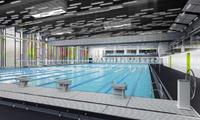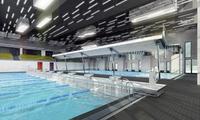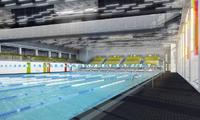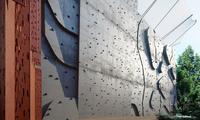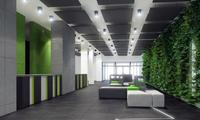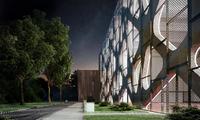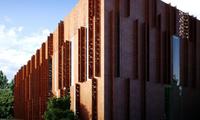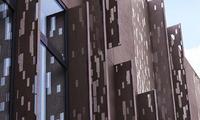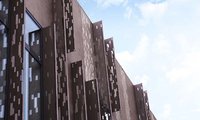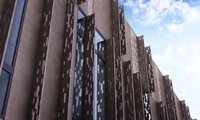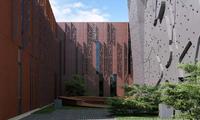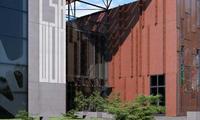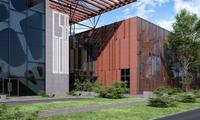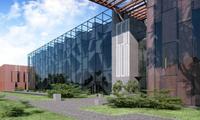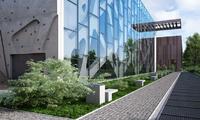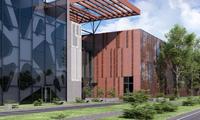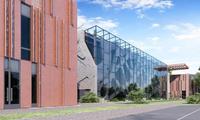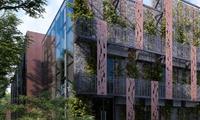Description
Sports and Rehabilitation Center of the Medical University of Warsaw will be erected along Trojden Street in Warsaw, on Banach Campus at Ochota, one of the districts of the capital of Poland. The Center will perform sport and didactic functions, located in the following complexes, interconnected by means of an underground parking and technological facilities of water treatment:
- Didactic complex of Physiotherapy Propaedeutics composed
of:
- gym and
multipurpose space, thanks to a moveable wall, it is possible to expand them
into one big sports area.
- A complex of a gym and specialist premises along with a
didactic complex of the Physical Education College and administrative
complex
- sports hall of
the dimensions 44.90m x 25.80m is adapted to practicing the following sports: volleyball,
basketball, tennis, handball, indoor football; two two-surface acoustic
curtains that enable to divide three separate and independent sectors; a complex
of specialist halls is composed of: gym, combat
fights hall, fitness hall.
- Complex of the Olympic pool with lifeguards and coaches
rooms
- on the level of
the first floor a general fitness gym and a fencing room.
- Complex of training pool with a steam and dry sauna
- Connector with
cafeteria
- from
cafeteria, there will be a direct access to a green terrace covered with a
folded membrane structure.
The espalier of maples along Prince Trojden Street has
inspired the designers to open southern facades to the greenery that will merge
inside the Center. Thanks to this, the users of the pools will be able to
feel as if they swim among trees. Irregular
frontage with recesses and a green piazza creates a harmonious composition;
glazed facades of the complexes were designed as a spatial complement of the
espalier. All facade
separations/elevation divisions refer to the Fibonacci sequence, used to
describe natural phenomena, including the growth of the trees. Vertical COR-TEN weathering steel sheets, laser
perforated and fixed to the walls, perform the function of vertical shaders and
allow to obtain the effect of light filtered through leaves, both: inside and outside. The facades also perform a usage function, on the western side of the
internal piazza a climbing wall has been designed that, thanks to the use of
folded membrane roof, can be used also during adverse weather conditions. The architecture refers also to the existing
urban tissue and fits into the surrounding buildings.
The greenery dominates inside the object and outside of
it. In the mail hall, there are green module walls,
eastern facade is all covered with plants that make up a unique vertical carpet
of flowers, grass grows on the roofs of all buildings.
It is obvious that the use of the Olympic pool on the daily
basis is connected with high expenses. Due to this reason, one of the
fundamental guidelines on the design stage, was to make that the complex of
pools be multifunctional. The bigger of
the pools of the SRC of the MUW, of the dimensions 25m x 51.25m, and the depth
of 2 m, designed in the steel panels technology is characterized by a series of
innovative solutions, often designed at a particular order. These were:
- mobile partition in a form of a transport platform
that serves to separate a basin of two separate pools of any dimensions;
- the shallowing bottom applied along the entire width of the pool and
for a distance of 10 m makes it possible to shallow the pool to any depth,
- a lowerable acoustic screen, in the form of a man-made leather curtain
which divides the pool hall into two freely shapeable dimensions, is affixed to
the technical platform installed under the roof above the audience; from the
technical platform maintenance works will be conducted and operation of
lighting specially adapted to TV broadcasts;
These measures are to increase the profitability of facility
maintenance, and thanks to them the investor achieves possibilities of using
the facility not only for purposes of Olympic training or swimming
competitions, but also for all sorts of commercial activities e.g. a swimming
school, classes for mums and infants, aqua aerobic, etc.
Another of aspects considerably affecting the profitability of swimming
facility maintenance are costs of maintenance of audience stands. As part of
the Sports and Rehabilitation Centre of the Medical University of Warsaw, three
independent stands were created:
- an open permanent stand for 341
persons,
- a closed viewing terrace for sports
commentators and VIPs for 45 persons; it is a futuristic semi-circular
structure of bent glass suspended on a steel structure directly above the pool,
it guarantees greater privacy and separation from direct sources of noise,
which is particularly important during TV and radio transmissions;
- a moveable folding stand is located
above the training pool for 292 persons; it is a solution adapted to the
investor’s individual needs and ensures optimisation of maintenance costs and
space management; installed on special actuators it will be opened up only
during competitions with the facility full occupancy.
An interesting body or innovative functional solutions are not the only
features a good building should be characterised with. Modern architecture is
ruled by the same laws as other branches of the market and must be fashionable.
And undoubtedly ecology is fashionable. Fortunately, search for savings in
building maintenance and natural environment protection usually go hand in hand
as many investors have already found out.
The Sports and Rehabilitation Centre of the Medical University of Warsaw
has been equipped with solar installations and PV panels. That is why solar
energy will be used to heat the process swimming pool water, and in the event
the energy is not received, the solar system will be applicable to pre-heat
warm water. In the summer time, in turn, the solar system will be used to heat
water for showers and for welfare purposes and heat the swimming pool water. Rainwater
recovered from the roof, unfit for drinking, will flush toilets.
All installations are monitored by BMS covering by its operation control
and monitoring of AC central units, lights, heat sub-stations, etc. Owing to a
system of sensors and detectors the building can intelligently “react” to
changes in the environment, both inside and inside, which leads to the
maximisation of functionality, comfort and safety with simultaneous decrease of
the facility maintenance costs.
In cooperation with AI Architects Cyprus.




























